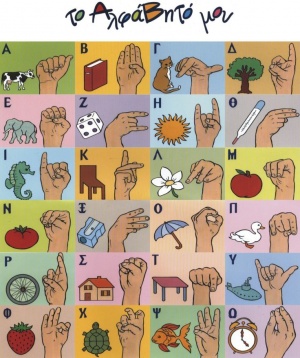Difference between revisions of "Language/Modern-greek-1453/Culture/Sign-language"
| Line 20: | Line 20: | ||
The Greek Sign Language as well as the Greek Braille were voted in the Parliament as equal to the Greek Language. | The Greek Sign Language as well as the Greek Braille were voted in the Parliament as equal to the Greek Language. | ||
<youtube> v=okYEemiSR8M </youtube | <youtube>v=okYEemiSR8M</youtube> | ||
<youtube> LK-0LCSmt5w </youtube | <youtube>LK-0LCSmt5w</youtube> | ||
Revision as of 06:25, 16 December 2022
Language is generally a dominant component of the culture of a social group, defining the identity of this, making it unique and differentiating it from other social groups.
Sign Language is the most natural way of communication and the only element of the culture of deaf people, as it is the only language that allows these people to communicate effortlessly, two-way and effectively.
Through it, their daily communication is served, and values and traditions of the community are transferred from the elders to the younger ones.
It is also used as an expression through art (sign poetry, sign language songs, deaf theater, sign language literature).
According to the above, the deaf community is now a linguistic minority and not a group of people who share the same disability.
Sign language is a complete visual and kinesthetic language. Its structural elements are gestures, movement, direction and orientation in space, as well as facial expressions and rarely some body movements. Each country has its own National Sign Language.
Greek Sign Language, (ENG) has been legally recognized as the official language of the Deaf community in Greece since 2000.
Knowledge of it is an important resource in a resume.
The Greek Sign Language as well as the Greek Braille were voted in the Parliament as equal to the Greek Language.
